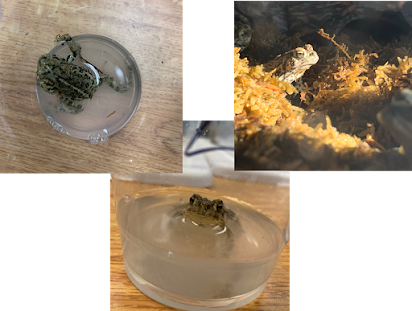Weeks Lab Update 2020
Boreal
Toads, an endangered high elevation species, and a CMU student were benefited
by the BIOSINQ award in 2020. My lab received funds for a mini centrifuge,
parafilm, and a DNA extraction kit. These supplies were requested to support
project opportunities for students working with a deadly fungal pathogen, the
chytrid fungus, that affects the skin of amphibians. Boreal Toad populations
have suffered greatly in Colorado from this pathogen and they are now locally endangered
with only one known remaining breeding population left in the Grand Mesa
National Forest. In early 2020, dozens of Boreal toads emerged from hibernation
in a captive breeding facility with this fungal infection and needed treatment.
In collaboration with Colorado Parks & Wildlife, they were brought to CMU
to be monitored and treated using an anti-fungal bath regiment. To ensure that the
treatment worked, the skin of the toads needed to be swabbed and analyzed in
the lab. The supplies provided by this BIOSINQ award allowed a CMU student to
be a part of this process. During this time, she was prepared for a summer
internship program in biological research (SIPBR) by learning husbandry &
handling of the animals, how to collect swab samples, and how to analyze the
data. These toads were cured of the fungus and 73 of them were released into
the wild.
The BIOSINQ financial support for the supplies helped to create the
opportunity for student enrichment and saving the lives of sick animals.
Thank
you to the donors who made this possible!




